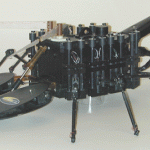Technology
My Very Excellent Mother Just Served us Nine Pizzas.
My Very Easy Method Just Speeds Up Naming Planets.
My Very Early Morning Jam Sandwiches Usually Nauseate People.
Mon Vieux Tu M'as Jeté Sur Une Nouvelle Planète!
-- Various mnemonic devices for remembering the order of the nine planets
I just found out that Mercury is shrinking.
The planet, already our most diminutive neighbor, has lost around 3 miles of its 3,000 mile diameter in its life, or one tenth of one percent.This may not sound like much, but in geological terms, three miles is immensely significant.
This boggling fact was…
[This article was originally posted at webeasties.wordpress.com]
About 4 years ago, I went to a seminar at TSRI that convinced me that cancer would be over in relatively short order. The man speaking (I wish I could remember who it was) showed that his group had been able to target radioactive heavy metals directly to melanoma solid tumors to destroy them. The data were striking; enormous, football-sized tumors shrank to nothing in a matter of weeks, and the therapy worked more than 90% of the time. I couldn't understand why this wasn't a bigger deal, why wasn't this front-page news?
As it…
Call me a skeptic, but this just sounds crazy.
Brighten the oceans by making billions of tiny bubbles. And what about the marine life that is now plunged into shadow? Changed ocean chemistry? International agreements about cost and location? "Unknown unknowns?"
What if we stop one day?
Are we ready to bet the biosphere and our civilization on new and extreme technologies? If anyone thinks "hell yeah, we can do anything!" then why can't we just replace our energy sources with non-carbon emitting ones?
Oh yeah, and what about the other carbon dioxide problem?
tags: coins, mint, manufacturing, technology, factory, education, streaming video
This is an interesting video showing how the â¬2 coin is made. This coin consists of two different metals that are squeezed together into one coin. Interestingly, it uses recycled copper -- I wonder how many construction sites have lost their copper piping to thieves who then sold it to recyclers for manufacture into Euros? I also have embedded a second video that discusses the history of coin making as well as describing how less complex coins are made.
Another look at coinmaking (admittedly, not as fancy as…
Cellularity is a new project by James King, a speculative designer working on biotechnology and interaction design. The project focuses on the potential future of smart pharmaceuticals, drug molecules surrounded by membranes that over time as technology advances may come to more and more closely resemble actually living things. He proposes a cellularity scale from totally non-living to really alive artificial cells. This quantification of "aliveness" in a way is something that may need to be done if some of the proposals of synthetic biology come to fruition. When does a membrane surrounding…
tags: Resonant Chamber, music, music video, film, animation, technology, computer graphics, Animusic, streaming video
This interesting animation is an argument for how a self-playing harp might work. The one thing that would improve its efficiency is to have a "plucker" that is dedicated to each string (as you see on the bass part of this contraption) rather than have each plucker pick at any or all of the strings. What do you think?
You can learn more at Animusic.
tags: condoms, manufacturing, technology, factory, education, streaming video
Well, now this is an interesting video: how condoms are made. The manufacturing process is actually quite interesting, and my favorite part was stress-testing the condoms. I wonder what the people who work in that factory say when asked at a dinner party what they do for a living?
This is the first time ever that I cared about SXSW conference or was jealous for not being there. Watching the blogs and Twitter stream, it appears to have been better and more exciting than ever. I guess I'll have to figure out a way to finally get myself there next year....
But this post is not really about SXSW. It is about presenting at such conferences. More specifically, how the back-channel (on Twitter and elsewhere) affects the way one needs to approach an invitation to speak at meetings where much of the audience is highly wired online: to say Yes or No to the invitation in the…
The new issue of Journal of Science Communication is now online (Open Access, so you can download all PDFs for free). Apart from the article on blogging that we already dissected at length, this issue has a number of interesting articles, reviews, perspectives and papers:
Users and peers. From citizen science to P2P science:
This introduction presents the essays belonging to the JCOM special issue on User-led and peer-to-peer science. It also draws a first map of the main problems we need to investigate when we face this new and emerging phenomenon. Web tools are enacting and facilitating new…
Three thought-provoking reads (even more thought-provoking taken together than each in isolation):
Crowdsourcing Honesty?:
In short, we are far more likely to be honest when reminded of morality, especially when temptation strikes. Ariely thus concludes that the act of taking an oath can make all the difference.
Craig Newmark on the Web's Next Big Problem:
And what is that? The question of who to trust online, according to Newmark. To solve it, he believes that what the web needs is a "distributed trust network" that allows us to manage our online relationships and reputations. I just…
A couple of unrelated technology things.
First Item: the iPhone vs. "non-Apple smartphone" contrast just got a little more interesting, with Tim Bray joining Google with his main job being to promote Android. He has an inaugural essay here which is very much wroth a read.
The most interesting thing about the essay that is overt is the comparison between the iPhone platform and the Android platform with respect to "freedom." The most interesting thing that is not overt or obvious is that Tim Bray's name does not appear anywhere on the page. That is a style and formatting goof, but a very…
Synthetic biology deliberately equates genetic networks to electronic circuits, cells to machines, organisms to factories. In synthetic biology, every living can be thought of as a cyborg, a living machine that can be manipulated, changed to meet our needs, parts swapped in and out like a computer. Some projects in synthetic biology and biologically inspired engineering hope to bring the analogy a step further, combining biological and actual electronic and mechanical components into a single engineered unit, with the goal of essentially making tiny autonomous cyborgs.
There are a lot of…
Last November, in Florida, I had the opportunity to see my first Space Shuttle launch. For the hundreds of millions of people who don't pay more than a passing notice to the fact that human beings still go into space on a regular basis, this is a fairly banal thing. But to those who camp out all day, plan trips around Cape Canaveral launch windows, and scrupulously follow the ins and outs of NASA politics, this is the bread and butter.
Unless you score tickets to the Kennedy Space Center, which has the official ambiance and a giant countdown clock, the best place to watch a NASA Shuttle…
How Privacy Vanishes Online. Pretty banal actually. Social networking has really changed things. As I've said before I'm fascinated by the large number of people who, even those who want to be anonymous, enter in their real email addresses when leaving a comment. There seems a default "trust unless you shouldn't trust" setting, so we naively input our information assuming it isn't being mined by someone. In any case, a bigger issue in the future I think will be stupid government officials who scan up documents which they shouldn't scan up. It's happened a few times so far, but I think it'll…
In his seminal 1991 essay, "The Work of Art in the Age of Digital Reproduction," the video artist Douglas Davis writes that digital bits "can be endlessly reproduced, without degradation, always the same, always perfect."
This is different, Davis argues, from analogue information. In the past, copying an audio signal -- for example, dubbing a copy of a cassette tape -- always involved an unpredictable loss of clarity, which Davis compares to waves washing on a beach, always breaking slightly differently. But "digital bits, compatible with the new generation of tools that see, hear, speak,…
The New York Times has a scary but numerically rich piece on the impending pension crisis in Europe. As in the days of yore Greece looks to be a pioneer. Here's an interesting pair of numbers:
According to research by Jagadeesh Gokhale, an economist at the Cato Institute in Washington, bringing Greece's pension obligations onto its balance sheet would show that the government's debt is in reality equal to 875 percent of its gross domestic product, which is the broadest measure of a nation's economic output. That would be the highest debt level among the 16 nations that use the euro, and far…
Yesterday I spent the day at the RTP headquarters, attending TEDxRTP. The TEDx conferences are small, locally organized offshoots of the well-known TED conference.
This was the first TEDx in the Triangle region (though Asheville beat us as being the first in the state) and, judging from the response of the audience, it seems everyone expects this will become a regular annual event. You can check out the Twitter account as well as the Twitter chatter if you search the #TEDxRTP hashtag.
The event was livestreamed and the rough videos are already up on the Ustream channel. Better quality videos…
On Wednesday, Bride Of Coturnix and I went to Ignite Raleigh. There was an Ignite show in many cities around the world that night, and the one in Raleigh was one of the biggest, with 702 people in attendance, in Lincoln theater (which is far too small for such a crowd - but crowdiness made it more intimate). It was a blast. I saw a lot of old friends, met some of the people I only know from Twitter or blogs, and met some new ones. All 19 talks were excellent, thought-provoking and, what is important at Ignite, they were all full of energy and fun (and funny!). It is hard to pick favourites,…
Today Microsoft CEO Steve Ballmer spoke at the University of Washington in the Microsoft Atrium of the Computer Science & Engineering department's Paul Allen Center. As you can tell from that first sentence UW and Microsoft have long had very tight connections. Indeed, perhaps the smartest thing the UW has ever done was, when they caught two kids using their computers they didn't call the police, but instead ended up giving them access to those computers. I like to think that all the benefit$ that UW has gotten from Microsoft are a great big karmic kickback for the enlightened sense of…
tags: handheld thermal cycler, LavaAmp, PCR, Polymerase Chain Reaction, DNA, molecular biology, Unreasonable Insitute, DIY, technology, Guido Núñez-Mujica, streaming video
Millions of people in the Global South suffer from neglected diseases, many of which could be treated, even cured, if they were detected early enough. But reliable, low cost diagnosis hasn't been available, as drug companies have no incentive to invest in the diseases of the poor. New pandemics can go undetected until they have spread out of control, like HIV, and treatable ailments can cripple impoverished communities…

